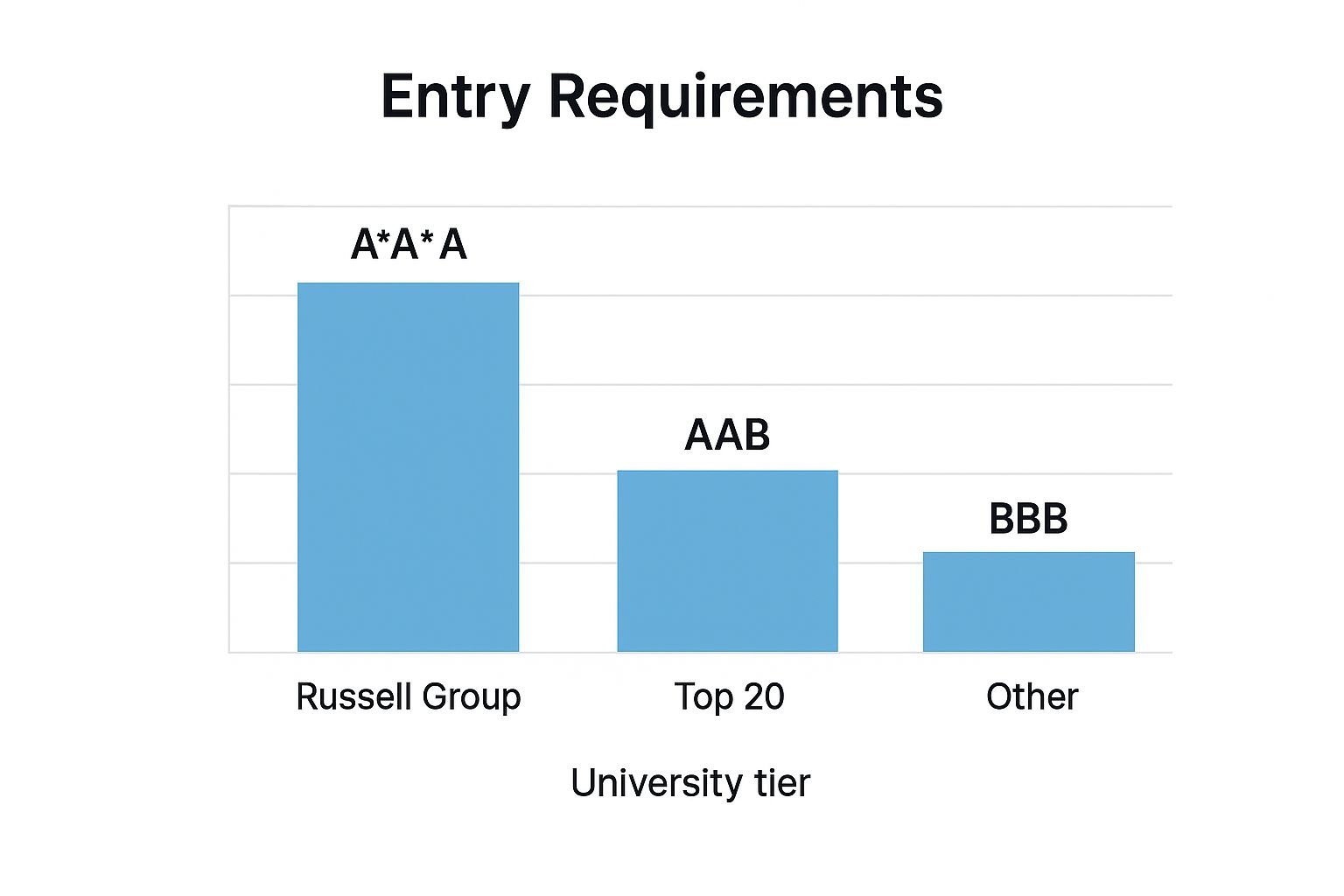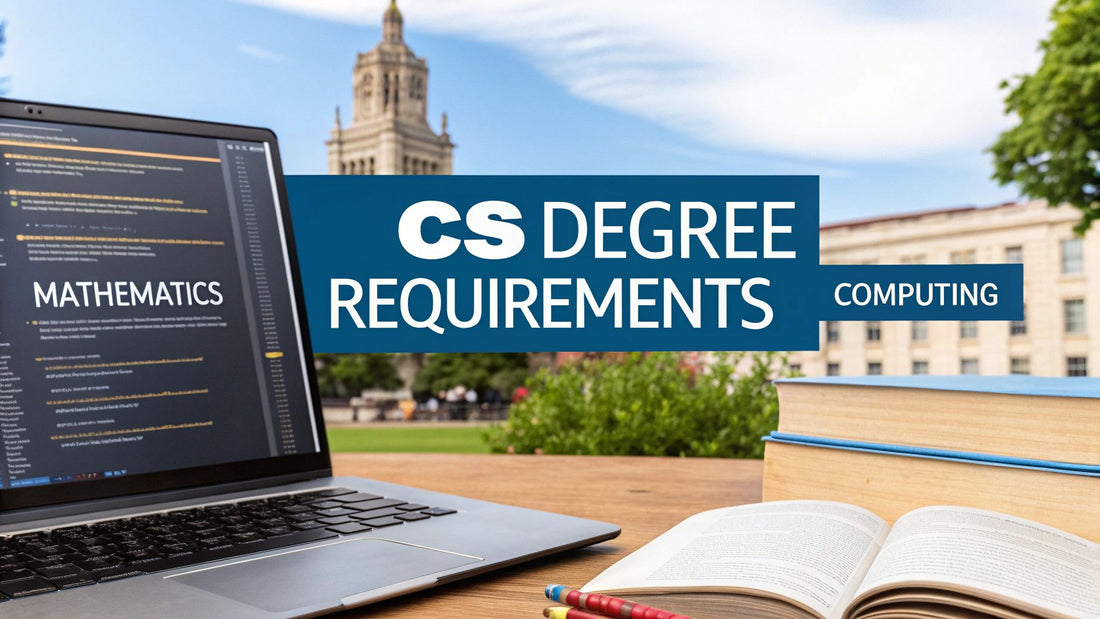Trying to get a place on a computer science degree course in the UK can feel a bit like cracking a code in itself. You know you need good grades, but what do universities really want to see? Let's break down the academic requirements, moving past the jargon to give you a clear picture of what you'll need.
A strong A-level in Mathematics is pretty much non-negotiable. It’s the foundation for everything you’ll learn, from programming logic to complex algorithms. Universities will also be looking at your total UCAS points, with the top-tier institutions setting a very high bar.
What UK Universities Really Want for Computer Science
So, what’s the secret to a successful application? It all starts with understanding the core subjects and qualifications that admissions tutors are looking for.
The Cornerstone of Your Application
Think of your application as a building. In this analogy, Mathematics is the concrete foundation. It’s the single most critical subject because it develops the logical reasoning, abstract thinking, and problem-solving skills that are the lifeblood of computer science. Without a solid grasp of maths, you’ll find it incredibly tough when you get to modules on algorithm complexity or data structures.
This is why the most competitive universities are so specific. The University of Oxford, for instance, typically asks for an A* in Mathematics, often alongside Further Mathematics or Computing. It’s a clear signal of the level of analytical thinking they expect from day one.
Understanding the Academic Tiers
Not all universities ask for the same grades. The requirements generally scale with the university's ranking and research focus. Knowing this can help you set realistic expectations and target the right universities for your predicted grades.
The table below gives you a rough idea of what to expect across different types of UK universities.
Typical UK University Entry Requirements for Computer Science
| Qualification | Top-Tier Universities (e.g., Oxbridge, Imperial) | Russell Group Universities (e.g., Manchester, Warwick) | Other Universities |
|---|---|---|---|
| A-levels | A*AA - A*A*A (with A* in Maths) | AAA - AAB (with A in Maths) | AAB - BBB (with A/B in Maths) |
| BTEC | Often not accepted alone; may require A-level Maths | D*DD - DDD (often with A-level Maths) | DDM - DMM (specific units required) |
| IB Diploma | 38-42 points (with 7 in Higher Level Maths) | 35-38 points (with 6/7 in Higher Level Maths) | 32-36 points (with 6 in Higher Level Maths) |
As you can see, there’s a clear jump in the grades needed as you move up the tiers, especially for the top Russell Group and Oxbridge-level institutions.

Alternative Qualifications and UCAS Points
While A-levels are the most well-trodden path into a computer science degree, they're definitely not the only route. Many universities happily accept other qualifications like BTEC Diplomas and Access to HE Diplomas.
These are translated into UCAS points, allowing admissions teams to compare different types of qualifications fairly. For example, an Access to HE Diploma with a high number of credits at Distinction can be seen as equivalent to top A-level grades. If you're on this path, it's vital to understand how an Access course translates to UCAS points to see where you stand.
Choosing the Right A-Levels to Secure Your Spot

Picking your A-levels is one of those defining moments on the path to a computer science degree. These choices aren't just about ticking boxes on a UCAS form; they're about building the intellectual foundation you'll lean on from your very first lecture. A smart selection now can give you a massive head start.
Think of it this way: if a computer science degree is a high-performance engine, then Mathematics is the fuel. It's the single most critical A-level, hands down. It provides the language for everything from algorithms and data structures to complex computational theory.
Those abstract concepts like calculus and algebra? They're the real-world tools you'll use to figure out how efficient a program is or to model complex systems. This is exactly why universities are so firm on this requirement—the problem-solving and logical deduction you build in A-level Maths are directly transferable to debugging code and designing software.
The Essential and the Advantageous Subjects
While Maths is the non-negotiable cornerstone, other subjects can seriously beef up your application and get you ready for the course's demands. Putting together the right combination shows admissions tutors that you've got a well-rounded and highly relevant skillset.
Here’s a breakdown of the subjects to have on your radar:
- Mathematics (Essential): As we’ve said, this is the big one. An A or A* is often a must-have for the top-tier universities.
- Further Mathematics (Highly Recommended): This is your turbo-charger. It dives into more abstract topics like matrices and complex numbers, which pop up all the time in advanced areas like graphics programming and machine learning. Taking it signals you're serious about the deep, theoretical side of the subject.
- Physics (Recommended): Physics is fantastic for teaching systematic problem-solving. It also gives you a grasp of how hardware and software interact at a fundamental level, perfectly complementing the logical thinking from Maths.
- Computer Science (Helpful): While you might be surprised to hear it's not always essential, this A-level gives you a practical head start. You'll arrive already familiar with programming fundamentals and computational thinking. That said, if it's a choice between this and Maths, universities will almost always prioritise Maths.
The academic bar for entry is undeniably high and keeps getting higher as the field grows in popularity. This makes choosing the right A-levels more important than ever for standing out in an increasingly competitive crowd.
Meeting High Academic Standards
The fight for a spot on a top computer science course is fierce, and the demanding entry requirements are a direct reflection of that. The heavy emphasis on top grades in specific subjects shows just how high the academic calibre needs to be to cope with the degree.
For instance, the computer science degree requirements in the UK set an incredibly high academic benchmark. For the 2025-26 admissions cycle, leading institutions like the University of Manchester are asking for A*A*A at A-level, with one of those being an A* in Mathematics.
This really drives home how crucial your academic profile is. It’s well worth taking a look at the full entry requirements to get a clear picture of the competition you're up against.
Exploring Alternative Pathways and Admissions Tests
Think A-levels are the only way to get into a computer science degree? Think again. While they're a popular route, they’re far from the only one. Universities know that talent and ambition aren't always found on the traditional academic path, which is why they’ve opened up several other routes for aspiring tech pros.
This is brilliant news for everyone. It means that career changers, mature students, and anyone who took a different journey after school all have a fair shot. It’s all about creating opportunities for anyone with the right spark to succeed.
BTEC and Vocational Qualifications
A BTEC Level 3 Extended Diploma in IT or Computing is a fantastic, hands-on alternative to A-levels and is accepted by many universities. When admissions tutors look at your BTEC, they’ll often be interested in specific modules you’ve taken, like programming, systems analysis, or mathematics for computing.
One thing to keep in mind, though, is that the most competitive universities might ask for a BTEC to be paired with an A-level in Mathematics. This powerful combination shows you have both the practical skills and the rock-solid theoretical understanding needed for a top-tier degree. As always, double-check the specific entry requirements for the universities you’re most interested in.
Access to Higher Education Diplomas
For anyone returning to education after a break, the Access to HE Diploma is an absolute game-changer. These are year-long courses specifically designed to get you ready for the demands of university study, and they’re highly respected by admissions teams.
An Access to HE Diploma in a subject like Computing or Science gives you all the academic skills and foundational knowledge you need. It’s a powerful stepping stone to securing your place at university.
These diplomas are a brilliant way to prove your dedication and ability. If you want to dive deeper into this route, check out our guide on how Access courses prepare you for a future in computer science.
Admissions Tests and Contextual Offers
Some of the top universities use admissions tests to get a better sense of how you think. These aren't about rote learning; they’re designed to see your problem-solving skills in action.
- Test of Mathematics for University Admission (TMUA): This test is used by institutions like Cambridge, Warwick, and LSE to assess your mathematical reasoning and logic. It’s less about advanced maths and more about how you approach a problem.
On top of this, many universities make contextual offers. This is a fairer approach to admissions where they might lower the standard grade requirements for applicants who’ve faced educational or personal challenges. It’s a way of looking at your individual circumstances and making sure that true potential isn’t overlooked. Knowing all the avenues available is the key to building a strong application.
What to Expect from Your Computer Science Degree

So, you’ve met the entry requirements and landed a spot on your dream course. Fantastic! Now the real adventure begins. A computer science degree is designed to be an intellectual journey, taking you from someone who uses technology to someone who creates it.
Think of your first year as learning the alphabet and grammar of a brand-new language. You won’t be thrown in at the deep end. Instead, you'll start with core programming principles, often with friendly languages like Python or Java, to get a handle on the essential logic that makes all software tick. This foundational stage is absolutely critical for everything that comes next.
This step-by-step approach is a core part of computer science degree requirements across the UK. Universities carefully structure their courses to build broad and deep expertise over time. For example, some programmes involve completing over 20 different modules, with the first year dedicated to essentials like how computers operate, programming fundamentals, and the maths that underpins it all.
Core Concepts You Will Master
As you progress, you'll find that certain core modules pop up on almost every curriculum. These are the pillars of computer science, and getting to grips with them is non-negotiable. They might sound a bit abstract at first, but they have incredibly practical applications.
- Algorithms and Data Structures: This is the absolute heart of computational thinking. An algorithm is really just a step-by-step recipe for solving a problem. A data structure is about how you organise information—like a library's filing system—so you can find what you need efficiently.
- Object-Oriented Programming (OOP): This is a powerful and modern way to think about and organise your code. Instead of one long, tangled script, you learn to create reusable "objects" that bundle data and functions together. It makes your code cleaner, more efficient, and much easier to manage.
- Computer Architecture: This is where you get to pull back the curtain and see how a computer really works. You’ll learn about the physical bits and pieces—like CPUs and memory—and finally understand how they bring the software you write to life.
Your degree isn't just about learning to code. It's about learning how to think like a computer scientist—systematically, logically, and creatively—to solve incredibly complex problems.
From Foundations to Specialisation
The real excitement often kicks in during your second and final years. This is where you get to start tailoring your degree to what genuinely fascinates you. Once you’ve cemented your understanding of the fundamentals, you can start exploring the specialised fields that are shaping our world.
This is your chance to dive deep into some seriously interesting topics. Depending on your university, you could be exploring modules in areas like:
- Artificial Intelligence (AI) and Machine Learning
- Cybersecurity and Ethical Hacking
- Software Engineering and Project Management
- Web Development and Mobile Applications
- Data Science and Big Data Analytics
This structure ensures you graduate with more than just a solid, all-round knowledge of computing. You'll also have deeper expertise in a high-demand area, setting you up perfectly for a specific career path.
If you're thinking about starting this journey through a more flexible route, you might be interested in our guide on what online learning for a computer science diploma looks like.
Building the Skills That Matter Beyond Grades
Getting good grades will get your CV noticed, but it’s a whole different set of skills that will actually land you the job. While meeting the formal computer science degree requirements is your first hurdle, it's the practical and personal skills you build along the way that truly make you stand out. These are the abilities that turn textbook theory into real-world, working solutions.
Take problem-solving, for instance. It's so much more than a buzzword to stick on your CV. It's about looking at a massive, overwhelming challenge and knowing how to break it down into small, bite-sized pieces you can actually tackle.
Think about debugging a stubborn bit of code. You don't just stare at the screen and hope for the best. You isolate the problem, you test a few theories, and you work through the logic step-by-step until you squash that bug. That analytical mindset is the core of what a computer scientist does, and you’ll sharpen it with every project you take on.
Developing Your Technical and Personal Toolkit
Logical reasoning is the engine driving your problem-solving, but other skills are just as crucial, especially when you’re thrown into a group project or your first job. The tech world is built on collaboration, which makes being a team player non-negotiable. You'll need to get good at explaining your ideas clearly, listening to different perspectives, and pulling together towards a common goal.
To build a profile that truly impresses, you’ll want to focus on:
- Systematic Problem-Solving: Don't shy away from the hard stuff. Actively look for the most complex problems in your coursework or personal projects to really flex those deconstruction and logic muscles.
- Clear Communication: Can you explain how an API works to your grandad? Learning to translate technical jargon for a non-tech audience is a hugely valuable skill.
- Effective Teamwork: Get stuck into group assignments. Learning to code with others using tools like Git is just as important as the code you write yourself.
- Adaptability and Curiosity: Tech moves fast. Get into the habit of learning a new programming language or playing with a new tool just because you’re curious.
The ability to translate complex technical details into clear, understandable language for non-technical stakeholders is a superpower. It bridges the gap between the code and the business, making you an invaluable asset to any team.
You won't master these skills just by sitting in a lecture hall. The real growth happens when you get your hands dirty. Join a hackathon, contribute to an open-source project, or just build something cool on your own. These experiences show initiative and prove you can do the work, which often speaks louder to employers than grades alone.
Launching Your Career After Graduation

So, you've made it through the late-night coding sessions and complex algorithms. What's next? Graduating with a computer science degree is like being handed a master key to the professional world. The skills you’ve spent years honing—from logical problem-solving to building intricate systems—are in incredibly high demand across almost every industry you can think of.
The paths opening up in front of you are both varied and genuinely exciting. In fact, tech roles are projected to grow at twice the rate of the overall job market over the next decade. You’re stepping out with a qualification that’s about as future-proof as it gets.
Popular Career Paths for Graduates
While the possibilities are nearly endless, a few well-trodden routes are especially popular with new graduates. Each of these roles takes the core problem-solving mindset you've developed and applies it in a unique and challenging way.
- Software Developer: This is the classic path for a reason. You’ll be the one designing, building, and maintaining the software people rely on every single day, from the apps on their phones to the complex enterprise systems that run big businesses.
- Data Scientist or Analyst: Did you find yourself drawn to the mathematical and statistical side of your course? This is where you get to become a digital detective, uncovering meaningful patterns in huge datasets that help organisations make smarter, data-driven decisions.
- Cybersecurity Analyst: In this vital role, you’re on the front line of digital defence. You'll use your technical know-how to protect networks and systems from threats, identifying vulnerabilities and responding when breaches happen.
A computer science degree sets you up for success in fields stretching from pure software engineering to design, consulting, and data analytics. Whichever path you choose, you’re well-equipped for an engaging and rewarding career.
Advancing with Further Study
For some, an undergraduate degree is just the starting point. If a specific area like Artificial Intelligence, machine learning, or theoretical computing has really captured your imagination, diving deeper with further education can be a fantastic next move.
A Master's degree (MSc) lets you specialise in a niche field, turning you into an expert candidate for those highly technical roles that demand deep knowledge. And for anyone with a real passion for research and pushing boundaries, a PhD opens up doors to academia or corporate R&D, where you could be contributing to the next wave of technological innovation.
Frequently Asked Questions
When you're looking at computer science degrees, it’s easy to get tangled up in the specific entry requirements. Let's clear up some of the most common questions we hear from applicants.
Is A-Level Computer Science Essential to Study It at University?
You might be surprised to hear this, but no, it’s not essential for most UK universities—even the top-tier ones. While it's definitely helpful, admissions tutors actually place a much higher value on A-Level Mathematics.
Why? Because Maths is what really builds the core logical and abstract thinking skills that are fundamental to the entire degree. In fact, Further Mathematics is often seen as more valuable than the Computer Science A-level. If you have to choose, always prioritise getting a top grade in Maths.
Can I Get Into a Computer Science Degree with a BTEC?
Yes, absolutely. Many universities will happily accept BTEC Level 3 Extended Diplomas in IT or Computing. But, it's really important to check the small print here.
The most competitive universities will almost always require you to have an A-Level in Mathematics alongside your BTEC. This is their way of making sure you have a solid grasp of the theoretical side of things.
Always double-check the specific entry requirements for every single university on your list. What one institution accepts for vocational qualifications can be very different from the next.
What if My School Does Not Offer Further Mathematics?
Don't panic. While taking Further Maths gives you a strong advantage, it’s not a strict requirement for most computer science courses. Universities are well aware that not all schools and colleges can offer it.
If you haven’t been able to take it, you’ll just need to prove your ability with an exceptional grade in your standard A-Level Maths—often an A*. You might need to put in a bit of extra work during your first year to catch up on certain advanced concepts, but it’s completely doable.
Ready to take the next step towards your degree without traditional A-levels? Access Courses Online provides accredited online Access to HE Diplomas that are your direct pathway to university. Find out more at https://accesscoursesonline.com.

